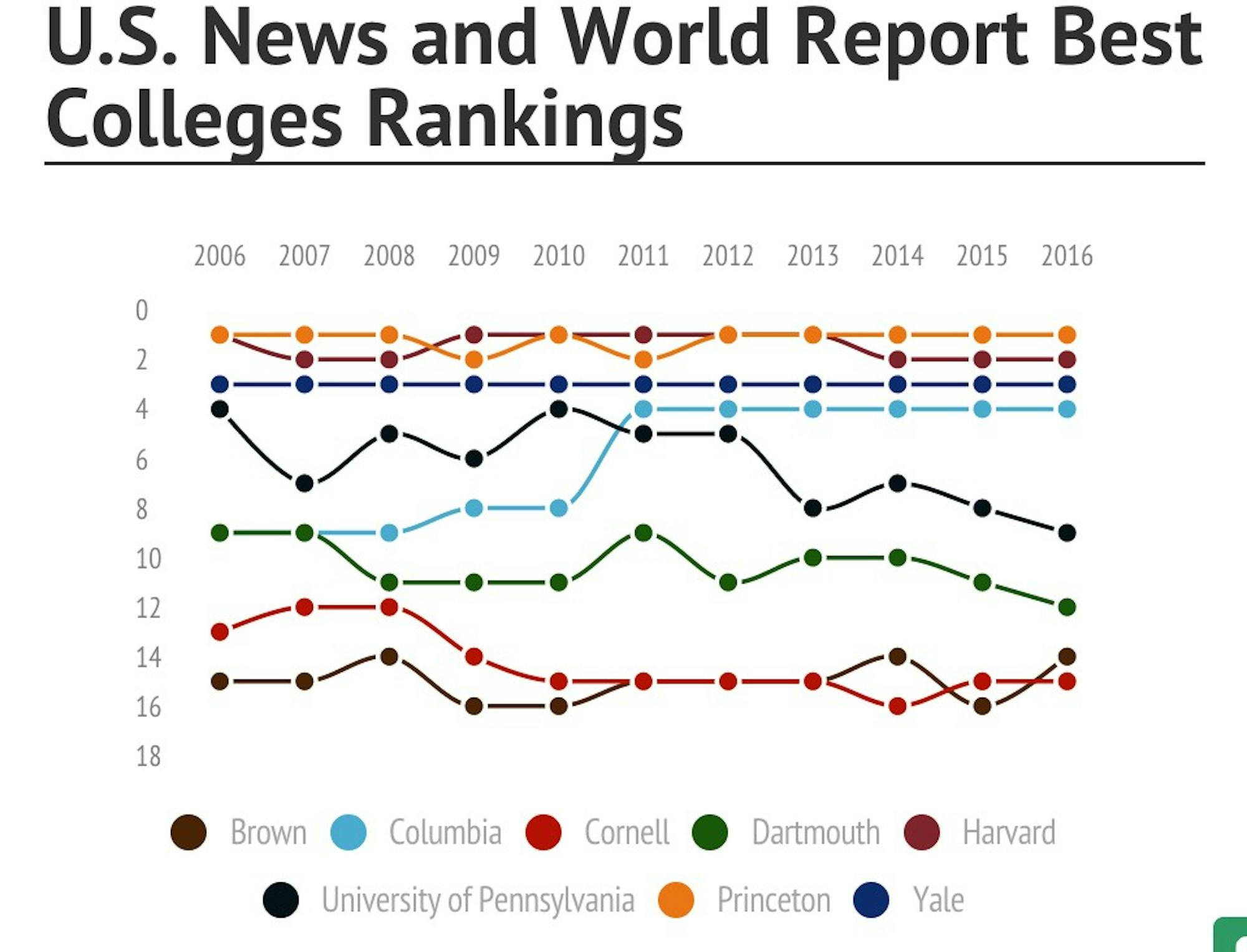Dartmouth failed to crack the top 10 on the U.S. News and World Report’s annual ranking of national universities for the second consecutive year, falling to a tie for 12th place with Northwestern University. The College also rose in the publication’s best undergraduate teaching list, rising from fourth to second place this year, although the College had ranked first for multiple years prior to 2014.
The U.S. News and World Report’s lists are among the most well-known college rankings, and the College has not topped its 2011 ninth-place position in recent years.
Interim dean of admissions and financial aid Paul Sunde said that he had hoped the College would place better than 12th, though he feels the national universities list is less valuable to prospective students than more specific lists that rank individual programs and college strengths.
Sunde said that he is especially proud of the College’s student-to-teacher ratio, saying that it is indicative of Dartmouth’s commitment to serving undergraduates. Sunde said that he prefers to focus on the strengths of the College.
“Maybe it’s just that admissions people are forever optimists,” he said. “I tend to look at whatever we are doing well and recognize our strengths.”
Sunde said the graduation and student-retention rates are more important to applicants and their parents.
“People are wondering if the school is actually delivering on its promise of graduation,” he said.
Mark Robison, a professor of clinical education and history at the University of Southern California who has instructed courses on higher education, said that there is not much difference between schools in the top 20 spots on the U.S. News list.
Robison said the fact that the rankings’ methodology shifts from year-to-year is a sales tactic for U.S. News — if the rankings change, the lists inspire more customer interest and purchases.
Robison, who also acts as a consultant to institutions of higher education, said that reforms, such as initiatives like the “Moving Dartmouth Forward” policy initiative, could on occasion spur an upward move in the rankings — if the reforms are effective.
Robison also noted that the College’s small size may bode poorly for the school under U.S. News’ methodology, since the national universities rankings emphasize research. With the exception of Princeton University, which placed first in this year’s list, the schools in the top 10 are research institutions with large graduate schools.
Sunde agreed with Robison, noting that the College must carry out effectively administrators’ planned reforms to rise in the rankings. He said that because education is such a dynamic field, the institution must keep changing in order to compete with peer institutions in the rankings.
“We need to think of what we want for Dartmouth in the future, and the rankings will follow,” Sunde said.
Willow Pagan ’19 said she cared more about the College’s standing on the undergraduate teaching list than on broader lists, which she did not consider in her decision to attend Dartmouth. Pagan said that the broader lists might not highlight the specific advantages of certain programs within a school.
“Some schools excel in departments that other schools might not excel in,” she said. “I think it is hard to rank a school overall.”
Jarrod Sinibaldi, a senior at the Loyola School in Manhattan, however, said that as a prospective applicant, the rankings are very useful in aiding his college process. He said he likes to use the rankings to research schools of which he has not heard.
But Sinibaldi said he does not care if a school drops in the rankings, as long as the drop is not significant.
“A slight drop of only a few spots would not change my perspective of the school,” Sinibaldi said.
Harrison Maidman ’18 said that the College’s reputation extends beyond its ranking on a list. He said that the College’s membership in the Ivy League remains more important.
“I think that it doesn’t really matter all that much,” he said. “Considering we are an Ivy, I don’t pay all that much attention to the rankings.”
Alex Weisman is a junior at Johns Hopkins University, which beat out the College for 10th on this year’s list for the first time in recent memory. He said that he believes Johns Hopkins’ rise in the rankings will spark an increased interest amongst prospective applicants.
“I think that people are finally catching on to the fact that we aren’t just a school of doctors but of top of the line students in every field,” Weisman said.




